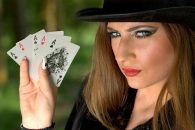Some players have the automated reaction to bluff frequently, and that is not recommended. They should just pay attention to the table ad maybe even feel it a little bit before they decide to bluff. Keep in mind that the other players are probably looking themselves for an occasion to bluff. You can tell sometimes when they are bluffing, and the same way they can tell it too sometimes when you are tring to bluff. It does work when nobody notices, but if they do it will only cost you money. So, use it wisely and only after you get some experience.
For reference and help, take a look at these situations when you must not, under any circumstances, bluff.
1. When it is obvious that you will.
If the players know you and know your stille, they can tell when you are bluffing in some situations. Don’t make this mistake because you would give them free money this way.
2. When you just bluffed and they caught you.
If you are already labeled by the rest of the players as a poor bluffer, you should let them forget about that and only then try it again, hoping this time you can do it right.
3. When you are faced with a dangerous flop.
Look carefully at the flop. if there is an Ace in it, consider the afact that someone might have a pair of aces. Aces make it beyond the pre-flop and player usually stick to them and most likely they will paly them. So, don’t bluff when faced to them. Also, don’t bluff against something that might stick to a straight, like: Q, J, 8. Maybe someone has the missing parts.
4. When you are playing against many players.
The manyer you are, the greater are the odds that a player has something and that he will stick with his cards. If you bluff, that palyer will win and you will lose a lot more. Statistic and odds forbit bluffing in this situation.
5. When you are clearly playing against bad players.
Bad players don’t realize the opportunity bluffing gives. They like to keep it honest, they don’t fear hands. And bluffing is only effective when it goes hand to hand with fear, fear of loosing the hand or fear of loosing a tournament or just the money.
6. When you have a streak of lost hands going on, or just one hand, but a big one.
You might be upset, and you are espected to be, you might act irresponsibly then and others know that. They will call you no matter what you do, because they know they are big chances that you are bluffing.
7. When you have limped in or you are situated in one of the bind positions.
Can’t explain why, but generally the people from blind position are expected to have a poor hand. And since they already made that blind bid, they are espected to go on, therefore bluff, even if the hand is poor. So, don’t bluff, others think you will and will call you in this situatiuation also.

